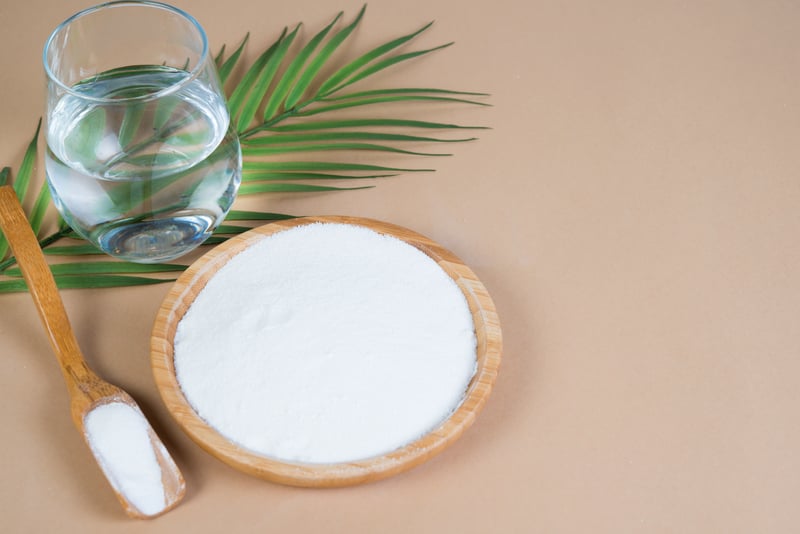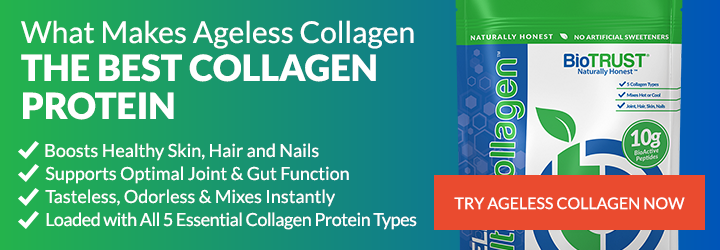What Is Collagen Good for? Here Are 5 Powerful Benefits

One of the biggest trends of this decade is adding collagen to just about everything—from sports nutrition supplements to packaged foods and beverages to age-defying beauty products. You can even find it added to functional foods like instant oatmeal, soups, wellness “shots” and juices, coffee creamers, and even water. So, what is collagen good for?
The Collagen Craze
Collagen use and options have exploded. By 2027, the global collagen market is expected to reach an astounding $7.5 billion, growing around 6.4% per year. Online searches on collagen have increased steadily since 2014.
You can find it not only in supplement stores but in grocery stores, coffee shops, beauty counters, and smoothie shops. Food influencers and trending cookbooks have added it by the scoop to all kinds of recipes—from lattes and smoothies to energy bites and power puddings to soups and stews and even baked goods.
Promised benefits include improved gut health, healthier joints, glowing “ageless” skin, balanced immunity, improved weight loss, and feeling younger, healthier, and more beautiful. So, what is it exactly?
What is Collagen?
The most abundant protein in the body, collagen is quite literally the glue that holds our bodies together. Within the body, it’s considered the building block of connective tissues, including bones, tendons, ligaments, skin, hair, and nails. 1 It’s a rich source of the amino acids glycine and proline. However, it’s also an incomplete protein as it lacks tryptophan, one of the nine essential amino acids.
Collagen was once considered an inferior protein, mostly in the form of gelatin. You may remember jello salads as a kid. Introduced to Americans in 1897, this infamous dessert is made by adding sugar (or another sweetener), flavoring, and coloring to gelatin. Gelatin itself is made from boiled connective tissue, such as bones, tendons, ligaments, typically from cows and pigs, which are dehydrated to create the powdered product most of us are familiar with.
Just add hot water, pour it into a mold, and chill. You’ll end up with the popular jiggly gelatin creations that are still widely popular, especially in the Deep South and rural Midwest as well as Utah, which still consumes more jello per capita than any other U.S. state. You can also find it in pre-made dessert cups in most grocery stores.
While jello does contain collagen and is low in calories and fat, it’s not exactly a health food. It’s high in sugar but low in fiber and protein and provides minimal, if any, other nutrients.
Fortunately, collagen products have come a long way. Some exceptionally high-quality collagen products combine a variety of five forms of collagen from pasture-raised cows, fish, eggs, and chicken, with tryptophan for a complete source of protein.
You can find powdered collagen peptides and collagen hydrolysates crowding online outlets, grocery stores, and beauty store shelves, promising to help us look and feel better from the inside out. They come in a powdered form that’s easier to digest and absorb (i.e., peptides or hydrolysates) that’s easy to add to drinks, smoothies, and a variety of foods. Best of all, research does appear to support many of the proclaimed benefits.
What is Collagen Good For?
Again, collagen is the most abundant protein in the body. Its fibrous structure provides shape and strength to many parts of the body. Sadly, though, as we get older, our bodies naturally produce less collagen, and we’re unable to replace collagen as quickly as it breaks down in the body.
It drops even more steeply due to excess exposure to sun damage, smoking, excess drinking, chronically high stress, not getting enough sleep, and a sedentary lifestyle.
So, what is collagen good for? Here are 5 ways adding a quality collagen product to your diet can help:
1. Promote Healthier Joints
Because collagen is the main protein found in joints and connective tissue, supplementation is often recommended for improved joint health. Collagen makes up about 60% of cartilage, which surrounds the bones and cushions the joints during high-impact movements. A breakdown of collagen can lead to a loss of this vital cushion, which can lead to joint pain and problems.
Collagen use for joint health has thus been supported by research. For example, a preliminary Penn State study found that 10 grams of collagen consumed daily for 24 weeks led to a decrease in joint pain when walking, standing, lifting, and at rest compared to a placebo group. 2
Another study found that collagen peptides helped reduce pain for athletes with functional knee problems, decreasing pain during sporting activities. 3
Finally, for people who are experiencing joint degradation as they age, collagen may also help reduce pain and improve function. 4
2. Support Stronger Bones
In addition to promoting healthy bones, collagen may help increase bone density. One small study found older women with age-related bone mineral density losses experienced increased bone formation and slowed degradation over 12 months with daily collagen use. 5
Bone loss becomes a bigger concern as we get older. Losing too much can increase the risk of bone breaks as well as osteoporosis. Other research has found that collagen supplementation may help reduce the risk. 6
BREAKING: Forget Taking Collagen, Try This 21-Second Trick for Healthier Skin & Hair Instead
3. Promote Glowing, Younger-Looking Skin
One of the most noticeable effects of declining collagen levels is found in the skin, including sagging and wrinkles. One study found that women, ages 35 to 55, who took 2.5 to 5 grams of collagen hydrolysate per day for a mere 8 weeks saw improved skin elasticity over those who used a placebo. 7
Another study found that women who used a collagen supplement for 60 days experienced a decrease in skin dryness and wrinkles with increased density and firmness to help the skin look noticeably younger. 8
Another 12-week study found that collagen is a functional health ingredient that may improve skin hydration, elasticity, and wrinkling and help combat photoaging of the skin. 9
A review study looked at several collagen studies and determined that orally consumed collagen supplements have been shown to improve collagen density in the skin and increase skin elasticity and hydration. In addition, the use of collagen was found to be generally safe with no adverse events reported. 10
4. Improve Weight Loss
One great way to help decrease hunger and improve satiety is to eat more protein. As a protein source, collagen then may help give you longer staying power and help you feel more satisfied after eating. If you aren’t as hungry, this can then help you eat less to better manage your weight. 11
5. Promote Muscle Growth
If you’re strength training to build muscle, you may see bigger results with collagen. In one study, for example, men who lifted weights while using a collagen peptide increased fat-free mass, body mass, and muscle strength more than men who resistance trained alone. 12
While the data is limited at this point, some research indicates consuming collagen may also benefit heart health,13 strengthen nails,14 hair growth,15 gut health,16 and sleep.17
Indeed, collagen supplementation may help us look and feel younger, healthier, and more beautiful.
In addition to consuming more collagen protein in the body, you may also help boost your body’s own production by providing key nutrients. For example, high-protein foods like fish, poultry, meat, eggs, dairy, and legumes are rich in glycine, proline, and hydroxyproline, which the body uses to build collagen. Zinc, found in shellfish, legumes, meats, nuts, seeds, and whole grains, is another nutrient needed for collagen production. Vitamin C is another nutrient needed to boost collagen levels. Vitamin C-rich foods include citrus fruits, berries, leafy greens, bell peppers, and tomatoes.







